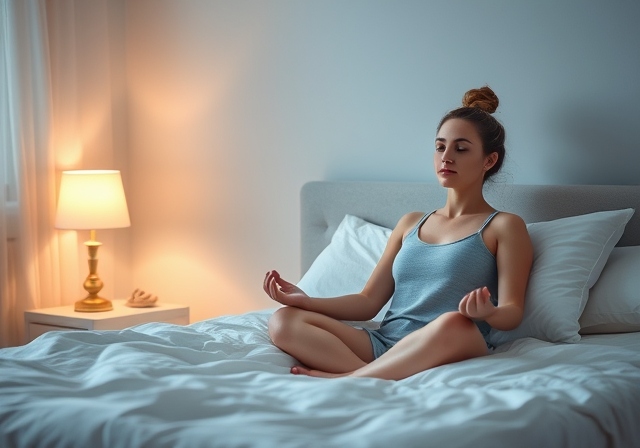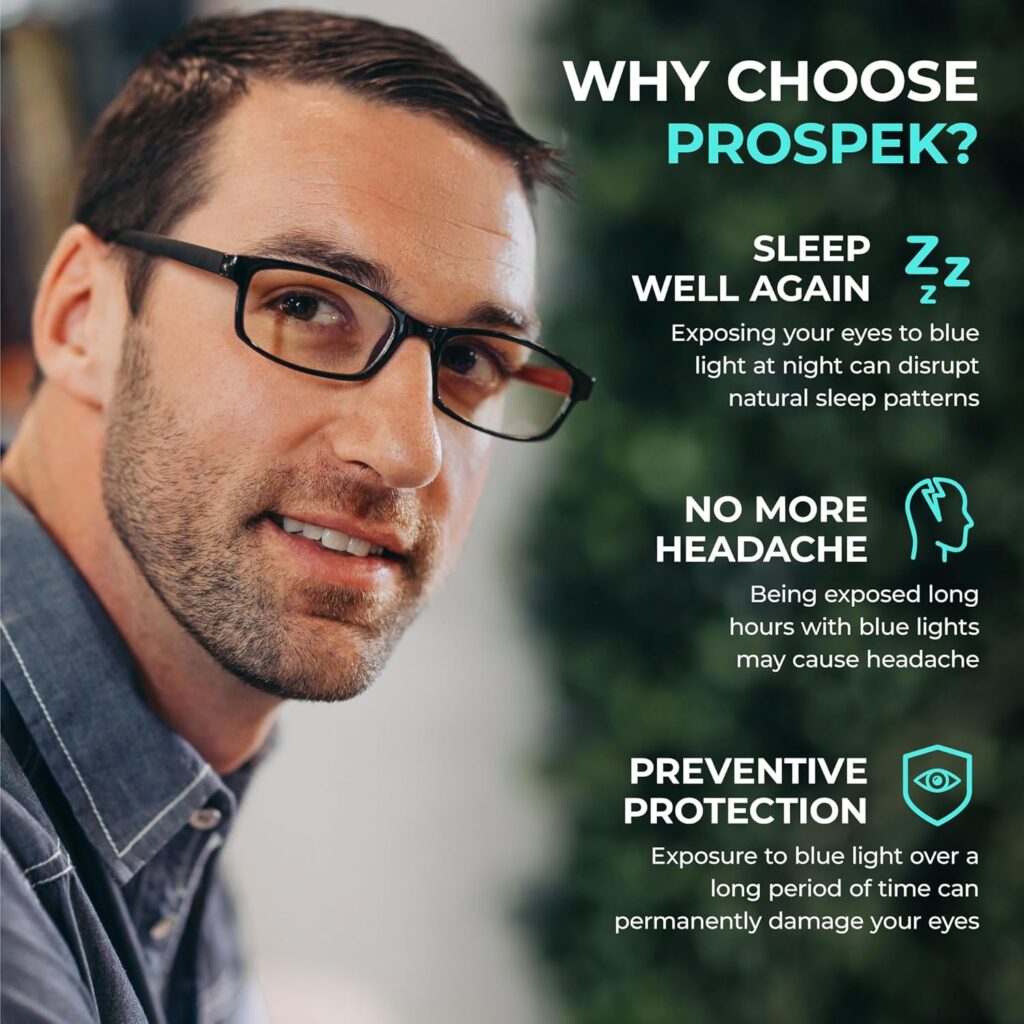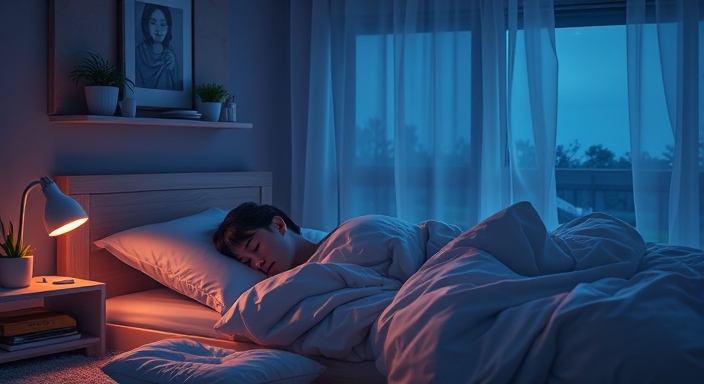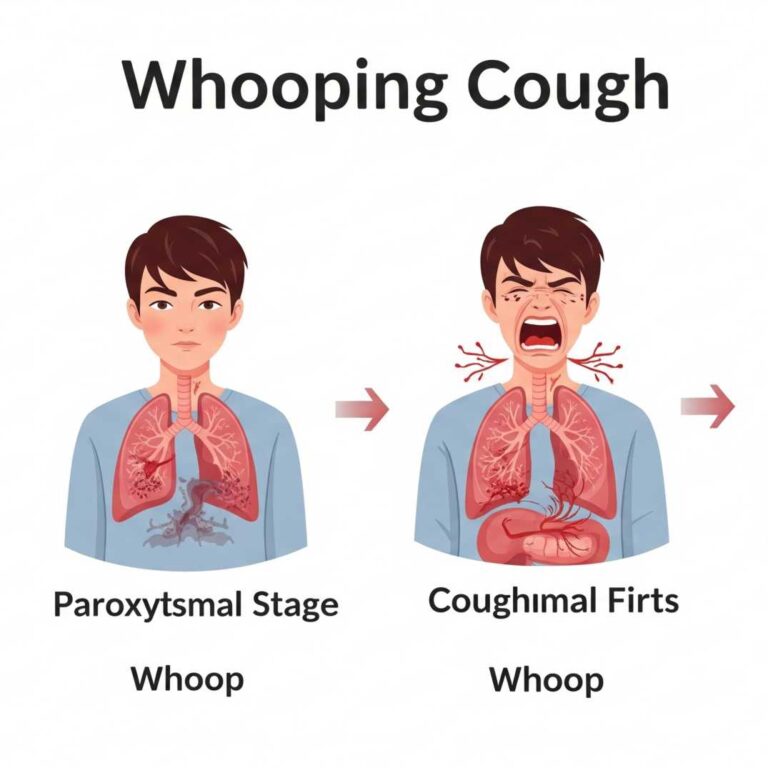How to Sleep Fast in 5 Minutes: Miracle Tips for Instant Rest
Getting a good night’s sleep can sometimes feel like an unattainable goal, especially when stress, unwanted thinking, financial stress, and discomfort keep you awake. If you’ve ever laid in bed tossing and turning, wishing you could sleep fast, you’re not alone. Many people struggle with falling asleep, but what if you could learn how to sleep fast in just 5 minutes?
To address this, it’s essential to understand the common culprits behind sleeplessness:
Anxiety and Stress
When your mind is racing with thoughts about life’s problems and difficulties, it can create a cycle of anxiety and stress. This mental strain can significantly impact your sleep, making it hard to both fall asleep and stay asleep. Racing thoughts, an elevated heart rate, and other symptoms of anxiety can disrupt your rest.
Caffeine Intake
Caffeine, found in coffee, tea, and many soft drinks, is a well-known stimulant. Consuming it in the afternoon or evening can increase alertness and delay your ability to fall asleep. To improve sleep, it’s wise to avoid caffeinated beverages as bedtime approaches.
Blue Light Exposure
Electronic devices like smartphones, computers, and TVs emit blue light, which can interfere with melatonin production. Melatonin is the hormone that regulates your sleep-wake cycle. Reducing screen time before bed can help improve your ability to fall asleep.
Poor Sleep Hygiene
Maintaining a consistent sleep schedule is vital for good sleep hygiene. Inconsistent bedtimes, using electronic devices in bed, and eating heavy meals before sleeping can all interfere with your sleep quality. Strive to establish a routine that supports restful sleep.
By addressing these issues, you can enhance your sleep quality and overall well-being. Taking small, deliberate steps to manage stress, limit caffeine and screen exposure, and improve your sleep habits can make a world of difference.
In this article, we’ll walk you through proven techniques and tips that can help you drift into a restful slumber, quickly and naturally.

FAQs about How to Sleep Fast in 5 Minutes
1. How can I fall asleep in 5 minutes naturally?
To fall asleep in 5 minutes, practice relaxation techniques such as the 4-7-8 breathing method, progressive muscle relaxation, and calming visualization techniques.
Also, please ensure your environment is conducive to sleep by making your room dark, cool, and quiet. You might want to invest in an affordable white noise machine from Amazon to create the ideal sleep atmosphere or try relaxation CDs if you’re more into auditory help.
2. Is it possible to fall asleep in 5 minutes?
Yes, while it might take some practice, it’s entirely possible to fall asleep quickly with the right methods. Techniques like controlled breathing and muscle relaxation can signal to your body that it’s time to rest, helping you sleep faster. Speaking of relaxation, weighted blankets available on Amazon are perfect for creating a calming effect. Many people swear by them for improving sleep quality.

How Can Magnesium Influence Sleep Quality?
Magnesium plays a crucial role in enhancing sleep quality through multiple mechanisms:
- Regulation of Melatonin: This essential mineral helps regulate the production of melatonin, often referred to as the sleep hormone. By ensuring effective melatonin production, magnesium can help synchronize your sleep-wake cycles.
- Muscle and Brain Relaxation: Magnesium is known for its ability to relax both muscles and the brain. This relaxation promotes a faster transition into sleep and helps maintain a more restful state through the night.
- Calming Effects: Magnesium’s soothing properties help reduce stress and anxiety, allowing for a quicker and more peaceful descent into sleep.
To naturally boost your magnesium levels and enhance sleep quality, consider incorporating magnesium-rich foods into your diet. Some great options include:
- Leafy green vegetables (such as spinach and kale)
- Nuts and seeds (like almonds and pumpkin seeds)
- Whole grains (such as brown rice and quinoa)
- Legumes (including lentils and chickpeas)
If you’re finding it challenging to meet your magnesium needs through diet alone, a magnesium supplement might be beneficial. Supplements can effectively address deficiencies and offer a noticeable improvement in sleep patterns. Always consult a healthcare professional before starting any new supplement regimen to ensure it’s appropriate for your needs.
Understanding Poor Sleep Hygiene and Its Impact on Sleep
What is Poor Sleep Hygiene?
Poor sleep hygiene encompasses habits and routines that disrupt a healthy sleep cycle. These behaviors often include erratic sleep schedules, using electronic gadgets such as smartphones or laptops in bed, and consuming large meals close to bedtime. Such practices can throw your internal clock off balance, leading to restless nights and diminished sleep quality.
How Does It Affect Sleep?
The repercussions of poor sleep hygiene are numerous and can manifest visibly and physically. Inconsistent sleep patterns can result in noticeable fatigue, leading to sluggish daytime performance. You might notice dark circles under your eyes or experience difficulty concentrating. Moreover, the blue light emitted from screens can suppress melatonin production, making it harder to fall asleep and stay asleep.
By neglecting good sleep hygiene, you risk facing long-term health issues and a decrease in overall well-being. Reassessing and adjusting your nightly routine can aid in fostering more rejuvenating sleep and better daily functioning.
Understanding the Role of Circadian Rhythm in Sleep
The circadian rhythm plays a crucial role in regulating our sleep-wake cycle. This internal clock orchestrates a range of bodily functions based on a roughly 24-hour schedule, aligning our sleep patterns with the day-night cycle.
How It Works
- Natural Alignment: The circadian rhythm is naturally synchronized with the cycle of daylight and darkness. This rhythm ensures that we feel alert during the day and sleepy at night.
- Environmental Cues: Key external factors, like daylight, influence this cycle. Exposure to natural light promotes wakefulness while dimming lights signal the body to prepare for sleep.
Disruptions and Consequences
Interruptions to the circadian rhythm can lead to various sleep disturbances. For instance:
- Delayed Sleep Phase: Staying in bright environments late at night can trick our bodies into thinking it’s still daytime, delaying the onset of sleep.
- Difficulty Maintaining Sleep: Inconsistent sleep patterns can lead to difficulties staying asleep or waking up too early.
Supporting Your Circadian Rhythm
Understanding this biological timetable can guide us in making better sleep-related choices. To support a healthy circadian rhythm:
- Prioritize Quality Sleep: Aim for 7-9 hours of consistent sleep each night.
- Optimize Sleep Environment: Limit exposure to bright screens an hour before bed.
- Consistent Schedule: Go to sleep and wake up at the same time daily, even on weekends.
By nurturing our natural sleep-wake cycle, we can enhance not only our sleep quality but also our overall health and well-being.
To prevent sleeping during the day from affecting your sleep at night, aim to limit naps to around 30 minutes or shorter. By keeping naps brief, you can avoid diving into deeper stages of sleep, which could lead to grogginess. Short naps also help ensure that your nighttime rest remains undisturbed and rejuvenating. Following this guideline can help you feel more refreshed without compromising the quality of your sleep later on.
Why It’s Important to Fall Asleep Quickly
Before diving into how to sleep fast in 5 minutes, it’s important to understand why sleep is critical to overall health.
Sleep isn’t just a time for your body to rest; it plays an essential role in brain function, immune system health, emotional well-being, and overall energy levels. If you’re not getting quality sleep, the next day can feel like a struggle. Learning how to fall asleep quickly and stay asleep is key to maintaining your physical and mental health.
While many people focus on the quantity of sleep—often aiming for the recommended 7-9 hours—it’s crucial to prioritize the quality of that rest. Research shows that high-quality sleep can be more beneficial than merely hitting those hour targets. This means uninterrupted sleep cycles and reaching the deeper stages of sleep where true restoration happens.
Why Quality Matters More
- Brain Function: Quality sleep enhances cognitive functions, such as memory and concentration, allowing you to perform better in your daily tasks.
- Emotional Well-being: Good sleep quality can improve mood stability, reducing the risk of mood disorders and enhancing overall emotional health.
- Physical Health: Robust sleep supports your immune system, making you less susceptible to illnesses.
By focusing on how well you sleep rather than just how long, you can ensure that you wake up refreshed and ready to tackle the day. Balancing both quality and quantity creates the optimal sleep routine for your health and well-being.
If you’re not getting quality sleep, the next day can feel like a struggle. Learning how to fall asleep quickly and stay asleep is key to maintaining your physical and mental health.
Also, for a perfect sleep setup, don’t forget to grab some cozy memory foam pillows from Amazon—they can work wonders for keeping your head supported throughout the night, so you wake up feeling refreshed.
How can the science of sleep help improve sleep patterns?
Delving into the science of sleep provides valuable insights that can enhance our sleep habits and overall health. By understanding the biological and environmental factors that influence sleep, individuals can make informed decisions to support the body’s natural rhythms.
- Understanding Circadian Rhythms: The science of sleep highlights the significance of circadian rhythms—our body’s internal clock that regulates the sleep-wake cycle. By aligning daily activities with these natural cycles, individuals can improve their sleep quality.
- The Role of Light Exposure: Research shows that exposure to natural light during the day and eliminating artificial light at night can significantly impact sleep. Using blackout curtains or dimming lights before bedtime can reinforce this natural pattern, fostering deeper, more restorative sleep.
- Importance of Consistent Sleep Schedules: Sticking to a regular sleep schedule—even on weekends—helps regulate the body’s clock and can aid in falling asleep and waking up with ease. Science supports the idea that consistency is key to enhancing sleep quality.
- Benefits of Relaxation Techniques: Scientific studies recommend relaxation practices such as deep breathing, meditation, or yoga to signal the body that it’s time to wind down, aiding in a smoother transition to sleep.
- Impact of Diet and Exercise: The science of sleep also links dietary choices and physical activity to sleep quality. Consuming sleep-promoting foods, such as bananas or almonds, and engaging in regular exercise can positively influence sleep patterns.
By leveraging these scientific insights, individuals can make proactive adjustments to their sleep environment and lifestyle. This not only improves their rest but also enhances their overall well-being and health.
Understanding the Sleep Cycle: Stages and Their Impact on Sleep Quality
The sleep cycle is a complex process that plays a crucial role in our overall health and well-being. It comprises two main types of sleep: Rapid Eye Movement (REM) sleep and Non-Rapid Eye Movement (NREM) sleep. Each has distinct stages affecting sleep quality in unique ways.
Non-Rapid Eye Movement (NREM) Sleep
NREM sleep is divided into three progressive stages, each deeper than the last:
- NREM Stage 1: This is the lightest stage of sleep, where you might still be somewhat aware of your surroundings. It serves as a transition between wakefulness and deeper sleep.
- NREM Stage 2: During this stage, your body temperature begins to drop, and your heart rate slows. This is a preparatory stage leading into a deep sleep, crucial for physical restoration.
- NREM Stage 3: Often referred to as Slow Wave Sleep, this stage is characterized by very slow brain waves. It is the deepest form of NREM sleep, making it hard to awaken. This stage is vital for restorative rest, boosting immune function, and repairing tissues.
Rapid Eye Movement (REM) Sleep
REM sleep occurs approximately 90 minutes after falling asleep. Initially, it lasts about 10-20 minutes, increasing as the night progresses. This stage is marked by high brain activity, with quick eye movements.
- Dreaming: Most dreams occur during REM sleep. The brain’s vivid activity results in temporary muscle paralysis, preventing you from acting out dreams.
REM sleep is integral for mental processes, including memory consolidation and emotional regulation. Improving sleep quality hinges on maintaining a balanced sleep cycle, which supports both the physical and psychological aspects of health.
Enhancing Sleep Quality
Understanding sleep stages can guide you in enhancing sleep quality. Here are a few tips:
- Consistency: Establish a regular sleep schedule to align with your body’s circadian rhythm.
- Environment: Create a restful sleeping environment by minimizing light and noise.
- Mind Your Diet: Avoid caffeine and heavy meals close to bedtime to facilitate smoother transitions between sleep stages.
By fostering good sleep habits, you can harness the benefits of each sleep stage, leading to improved physical health, mood, and cognitive function.
Top Techniques on How to Sleep Fast in 5 Minutes
Falling asleep within a few minutes might seem impossible, but with the right techniques, it’s entirely achievable. These proven methods can help you get to sleep fast, even if you’re under pressure or over-stressed. Now, let’s explore How to sleep fast in just 5 minutes.”
This transition ensures the sentence flows smoothly and introduces the section in a helpful and engaging manner
1. Try the 4-7-8 Breathing Technique
Developed by Dr. Andrew Weil, the 4-7-8 breathing method has become one of the most popular techniques for falling asleep quickly. It is based on ancient yogic breathing patterns. Here’s how to do it:
- Inhale through your nose for 4 seconds.
- Hold your breath for 7 seconds.
- Exhale slowly through your mouth for 8 seconds.
This technique is great for reducing stress and anxiety, making it easier for you to drift off to sleep. It helps relax both your body and mind in just a few minutes. A relaxing atmosphere helps too. If you find breathing exercises difficult at first, consider a guided meditation app available on Amazon, which might help you get into the rhythm.
2. Progressive Muscle Relaxation (PMR)
Progressive Muscle Relaxation is another excellent technique to induce sleep in a short amount of time. This practice involves tensing and relaxing various muscle groups in your body, promoting a feeling of relaxation. Start by focusing on your feet and slowly work your way up to your head.
- Tense your muscles for 5 seconds.
- Relax the muscles for 30 seconds, noticing the difference in tension.
- Continue this process until you’ve relaxed your entire body.
This method promotes deep relaxation and calms both your body and your mind. Some people use tools like a massage pillow from Amazon to ease the tension in their neck and shoulders before bed to enhance this process.
3. Use Visualization Techniques
Visualization techniques can be an effective way to drift into sleep. Imagine a peaceful scene, like a beach at sunset or a quiet forest. Engage all of your senses by imagining the gentle sound of waves or the smell of fresh pine trees.
The key is to focus your mind away from stressful thoughts and immerse yourself in the relaxing imagery of your peaceful environment.
If you need help visualizing, consider investing in aromatherapy oils or a diffuser available on Amazon. Scents like lavender are known to help induce a state of calm and improve sleep.
4. Adjust Your Sleep Environment
Sometimes the best way to fall asleep fast is to optimize your environment. Noise and light are common disruptors that can interfere with your sleep quality. Here’s how to minimize their impact:
- Noise: Try to avoid noisy environments as much as you can. To counteract unavoidable disturbances, consider using white noise or calming music. A sleep sound machine or apps featuring gentle soundscapes can create a soothing atmosphere.
- Darkness: Make sure your room is as dark as possible. Use curtains or shades to block out light, as this helps you sleep faster. If necessary, a sleep mask can provide complete darkness for uninterrupted rest.
- Temperature: Your body tends to fall asleep more easily when the room is cool, around 60-67°F (15-19°C).
By setting the right environment, including controlling noise and light, you can signal to your brain that it’s time to rest, helping you fall asleep quickly. This targeted approach not only highlights the importance of minimizing distractions but also integrates them into a holistic strategy for better sleep.
5. Avoid Caffeine and Technology Before Bed

A good way to ease off screens is to use blue light filter glasses or install apps that limit screen time. You can find a range of blue light-blocking glasses available for purchase on Amazon.
While it might be tempting to check your phone right before bed, electronic screens can disrupt your ability to fall asleep fast. The blue light emitted from phones and computers can interfere with your body’s production of melatonin, the hormone responsible for regulating sleep.
Melatonin is crucial in the management of the sleep-wake cycle. Naturally produced by the body, this hormone helps regulate when you feel sleepy and when you wake up. It works by interacting with brain receptors to signal that it’s time to wind down.
Beyond its sleep-regulating prowess, melatonin is also a powerful antioxidant, protecting your body from the damage caused by free radicals. This dual role not only supports your rest but also contributes to overall health, making it an essential part of your nightly routine.
To maintain optimal melatonin levels, consider limiting your exposure to screens before bed. Instead, try winding down with a book or a relaxing activity to encourage the natural onset of sleepiness.
Understanding Mindful Meditation and Its Benefits for Sleep
Mindful meditation is a practice that centers around staying present and fully engaging with your thoughts, emotions, and physical sensations without passing judgment. This calming technique can be particularly beneficial for enhancing sleep quality.
How Mindful Meditation Can Improve Sleep
- Stress Reduction: By focusing on the present moment, mindfulness helps decrease stress levels, which is often a barrier to restful sleep.
- Relaxation: Engaging in this practice promotes a state of relaxation, making it easier to transition into sleep.
- Reducing Racing Thoughts: It aids in quieting a busy mind, allowing for deeper and more restorative sleep.
Steps to Practice Mindful Meditation for Better Sleep
- Choose a Calm Spot: Find a peaceful place to sit comfortably or lie down.
- Breathing Focus: Start by gently taking several deep breaths and closing your eyes.
- Breath Awareness: Direct your attention to your breath, observing its natural rhythm as it flows in and out.
- Refocus Gently: If your mind begins to wander, gently redirect your attention to your breathing.
- Non-judgmental Observation: Acknowledge any thoughts, feelings, or physical sensations that arise, but aim to not let them disturb your focus.
- Sustained Practice: Continue focusing on your breath for about 5-10 minutes or longer if needed, until you feel ready to sleep.
Incorporating mindful meditation into your nightly routine can assist in creating a serene mental state, paving the way for a night of quality sleep.
Can You Sleep in 5 Minutes?
It’s possible to fall asleep in just 5 minutes if you utilize the right techniques. While it might not always work for everyone, incorporating practices like deep breathing, muscle relaxation, and a comfortable sleep environment will significantly improve your chances of sleeping faster.
Remember that consistency is key—make these techniques part of your nightly routine, and over time, you may find it easier to fall asleep quickly.
PAA (People Also Ask) Questions:-
-
1. How do I fall asleep fast right now?
Relax using techniques like deep breathing (such as 4-7-8 breathing), muscle relaxation, or visualization to calm your mind and body quickly.
-
2. How to sleep fast in 5 minutes trick?
The 4-7-8 breathing method is a proven way: Inhale for 4 seconds, hold for 7 seconds, then exhale for 8 seconds to promote relaxation and sleep.
-
3. How do I fall asleep in 1minute?
Try deep muscle relaxation, and slow breathing, and create a quiet and cool environment to help your body relax instantly.
-
4. How can I fall asleep 10x faster?
Avoid caffeine, technology, and stressful thoughts. Use relaxation exercises like the 4-7-8 method and set a peaceful sleep environment with optimal lighting and temperature
Conclusion
Now that you have several techniques for how to sleep fast in 5 minutes, it’s time to practice and find what works best for you. By incorporating methods like the 4-7-8 breathing technique, progressive muscle relaxation, and adjusting your sleep environment, you’ll be able to drift off quickly and wake up feeling rested and ready to take on the day.












